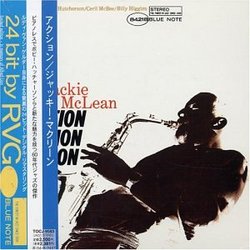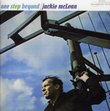| All Artists: Jackie Mclean Title: Action (24bt) (Mlps) Members Wishing: 1 Total Copies: 0 Label: Blue Note Japan Release Date: 3/8/2004 Album Type: Import, Limited Edition, Original recording remastered Genres: Jazz, Pop Styles: Modern Postbebop, Bebop Number of Discs: 1 SwapaCD Credits: 1 UPC: 766485299642 |
Search - Jackie Mclean :: Action (24bt) (Mlps)
 | Jackie Mclean Action (24bt) (Mlps) Genres: Jazz, Pop
Japanese 24-bit remastered reissue of 1964 album packaged in a miniature LP sleeve, features five tracks. Toshiba-EMI. 2004. |
Larger Image |
CD DetailsSynopsis
Album Description Japanese 24-bit remastered reissue of 1964 album packaged in a miniature LP sleeve, features five tracks. Toshiba-EMI. 2004. Similar CDs
|
CD ReviewsArguably the best reissue of 2004. greg taylor | Portland, Oregon United States | 07/01/2004 (5 out of 5 stars) "This promises to be one of the more important reissues of 2004. During the mid-Sixties, Jackie McLean made a series of albums for Blue Note that were as great as anything else that that company issued. One of the great mysteries of the label is that until recently some of this material (the 1964-1966 sessions) was available only on a limited edition Mosaic box. Someone at the label has come to their senses and begun to release these great sides. I am talking about the following albums: It's Time, Action, Right Now!, Consequences, Jacknife and High Frequency. Blue Note to my knowledge has reissued Jacknife, and Right Now! It's Time is available on a Japanese import. This current reissue is a 1964 date that featured McLean on the alto, his great bandmate of the period, Charles Tolliver on the trumpet, Bobby Hutcherson on the vibes, Cecil McBee on the bass and Billy Higgins on the drums. McLean during this period utilized the writings talents of Tolliver and this album is no exception. Two of the tunes, Plight and Wrong Handle are from Tolliver's pen. McLean penned the title tune. They also play I Hear a Rhapsody and a blues called Hootman. Part of what makes the McLean/Tolliver combination from this period so fruitful was the way that they each were trying to incorporate the radical changes of the new jazz of the period into their bop background. They would write songs without changes or just play outside the changes. McLean during this period continued to develop one of the most distinctive and personal sounds in the history of the alto sax. Tolliver, on the other hand, has a more traditional tone, that he puts to great use on ballads. He was also a soloist of great intelligence with the ability to surprise constantly with the way he would develop the melodic arc of his solo. In this I find him comparable to Wayne Shorter at this same period of time. Blue Note should be acknowledged for reissuing this music. I guess the larger question is why was it ever out of print? There are several people who produced great series of albums for Blue Note during this period- Andrew Hill, Joe Henderson, Herbie Hancock, Wayne Shorter, Lee Morgan, Freddie Hubbard, Grant Green, Grachan Moncur III, etc.. As I asserted earlier, McLean's albums are as great as any. This CD belongs in any jazz collection. I am somewhat abashed to admit that I have been listening to this music on a CDR. I already have mine ordered. Snap it up, people, while you have the chance." Classic William R. Nicholas | Mahwah, NJ USA | 02/09/2010 (5 out of 5 stars) "Jackie McClean may have been the most important artist on Blue Note in the 1960s, and one of the most overlooked in jazz.
The two most important terms I wrote above are Blue Note and Jazz. What becomes most instructive listenting to McClean's Blue Note albums, from, say, 1962-1966 is their contrast with Coltrane, Impulse, and out and out free jazz that dumped paint covering the whole jazz world. Impulse free jazz led by 'Trane was obviously the core of the music. But where ABCs jazz label took this to its outer extents, Blue Note did not. Blue Note, with McClean being perhaps its top envoy, definately did not dismiss the "new thing." Not at all. But they saw it as a piece of jazz, to be intigrated into the entire spectrum of the music. Take, for example, Mclean's Destination Out!, Grechen Moncour's Evolution, or Eric Dolphy's Out to Lunch. Or, just take Action Action Action. All these albums had the nuance of the avant gaurde--movement from tonal centers, obtuse changes, and some really great "out" playing. But Blue Note, McClean, and Action are not about free blowing, as were Impulse's Sanders and Shepp. The Blue Crew created a type of chamber jazz that used free elements, but these were to serve the composition: composistions that included careful, unique writing, instruments that populate Blue Note more than Impulse such as vibraphones, and almost classical sense of arramgement. Action is no exception. There is a freedom to the soloing and a atonality to the chord structures that you would not have gotton in pre-free 1950s jazz. Yet the skelotons of this music are blues, chamber classical, all the amazing elements that flowed so well into jazz to start with. The impact is a chamber jazz which has the best of all jazz--up until that time-and is a sub-genre too frequently ignored by the most informed fans. Don't you fall into this catagory. Do what I did. Go get some Action." |

 Track Listings (5) - Disc #1
Track Listings (5) - Disc #1